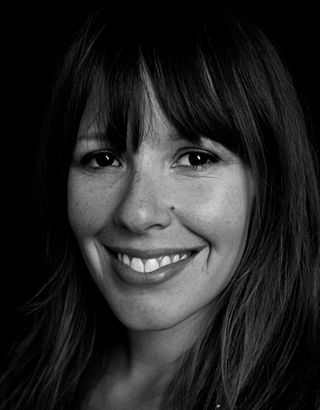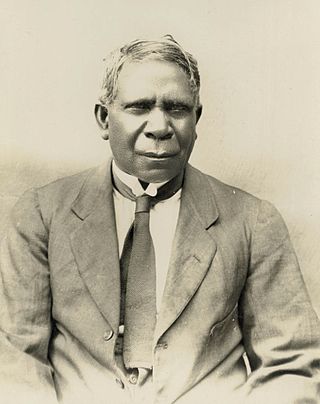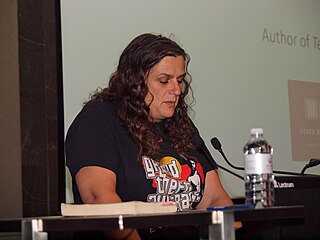The Miles Franklin Literary Award is an annual literary prize awarded to "a novel which is of the highest literary merit and presents Australian life in any of its phases". The award was set up according to the will of Miles Franklin (1879–1954), who is best known for writing the Australian classic My Brilliant Career (1901). She bequeathed her estate to fund this award. As of 2016, the award is valued at A$60,000.
The Victorian Premier's Literary Awards were created by the Victorian Government with the aim of raising the profile of contemporary creative writing and Australia's publishing industry. As of 2013, it is reportedly Australia's richest literary prize with the top winner receiving A$125,000 and category winners A$25,000 each.
Charlotte Wood is an Australian novelist. The Australian newspaper described Wood as "one of our [Australia's] most original and provocative writers".
Kimberley Starr is an Australian novelist and teacher. Her debut novel, The Kingdom Where Nobody Dies, was followed by The Book Of Whispers. Her next novel, Torched, was released by Pantera Press in 2020.
Alexis Wright is a Waanyi writer best known for winning the Miles Franklin Award for her 2006 novel Carpentaria and for being the first writer to win the Stella Prize twice, in 2018 for her "collective memoir" of Leigh Bruce "Tracker" Tilmouth and in 2024 for Praiseworthy.Praiseworthy also won her the Miles Franklin Award in 2024, making her the first person to win the Stella Prize and Miles Franklin Award in the same year.

Tara June Winch is an Australian writer. She is the 2020 winner of the Miles Franklin Award for her book The Yield.

Anita Marianne Heiss is an Aboriginal Australian author, poet, cultural activist and social commentator. She is an advocate for Indigenous Australian literature and literacy, through her writing for adults and children and her membership of boards and committees.
The Kibble Literary Awards comprise two awards—the Nita B Kibble Literary Award, which recognises the work of an established Australian female writer, and the Dobbie Literary Award, which is for a first published work by a female writer. The Awards recognise the works of women writers of fiction or non-fiction classified as 'life writing'. This includes novels, autobiographies, biographies, literature and any writing with a strong personal element.

Melissa Lucashenko is an Indigenous Australian writer of adult literary fiction and literary non-fiction, who has also written novels for teenagers.

Bruce Pascoe is an Australian writer of literary fiction, non-fiction, poetry, essays and children's literature. As well as his own name, Pascoe has written under the pen names Murray Gray and Leopold Glass. Pascoe identifies as Aboriginal. Since August 2020, he has been Enterprise Professor in Indigenous Agriculture at the University of Melbourne.

Mullumbimby (2013) is a novel by Australian author Melissa Lucashenko. It concerns Jo Breen, a Bundjalung woman, who buys some of her country and the conflicts that arises. Mullumbimby won the Fiction category of the Queensland Literary Awards in 2013.
Emily Bitto is an Australian writer. Her debut novel The Strays won the 2015 Stella Prize for Australian women's writing.
Ellen van Neerven is an Aboriginal Australian writer, educator and editor. Their first work of fiction, Heat and Light (2013), won several awards, and in 2019 Van Neerven won the Queensland Premier's Young Publishers and Writers Award. Their second collection of poetry, Throat (2020), won three awards at the 2021 New South Wales Premier's Literary Awards, including Book of the Year.

Fiona Wright is an Australian poet and critic.

Indigenous Australian literature is the fiction, plays, poems, essays and other works authored by Aboriginal and Torres Strait Islander people of Australia.

Claire G. Coleman is a Wirlomin-Noongar-Australian writer and poet, whose 2017 debut novel, Terra Nullius won the Norma K Hemming Award. The first draft of resulted in Coleman being awarded the State Library of Queensland's 2016 black&write! Indigenous Writing Fellowship.

Too Much Lip (2018) is a novel by Australian author Melissa Lucashenko. It was shortlisted for the 2019 Victorian Premier's Literary Award for Indigenous Writing and the Stella Award. It was the winner of the 2019 Miles Franklin Award.
Jared Thomas is an Australian author of children's fiction, playwright, and museum curator. Several of his books have been shortlisted for awards, and he has been awarded several fellowships, including a Churchill Fellowship in 2019. As of November 2024 Thomas is a research fellow for Indigenous culture and art at the South Australian Museum and the University of South Australia.
The Victorian Premier's Prize for Indigenous Writing is a prize category in the annual Victorian Premier's Literary Award. The award commenced in 2004 and in 2012 the prize was valued at A$20,000. The winner of this category prize competes with the other category winners for overall Victorian Prize for Literature valued at an additional A$100,000. Nominees are allowed to enter other categories of the Victorian Premier's Literary Awards.
Edenglassie is a 2023 novel by the Australian author Melissa Lucashenko.









